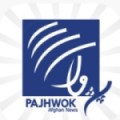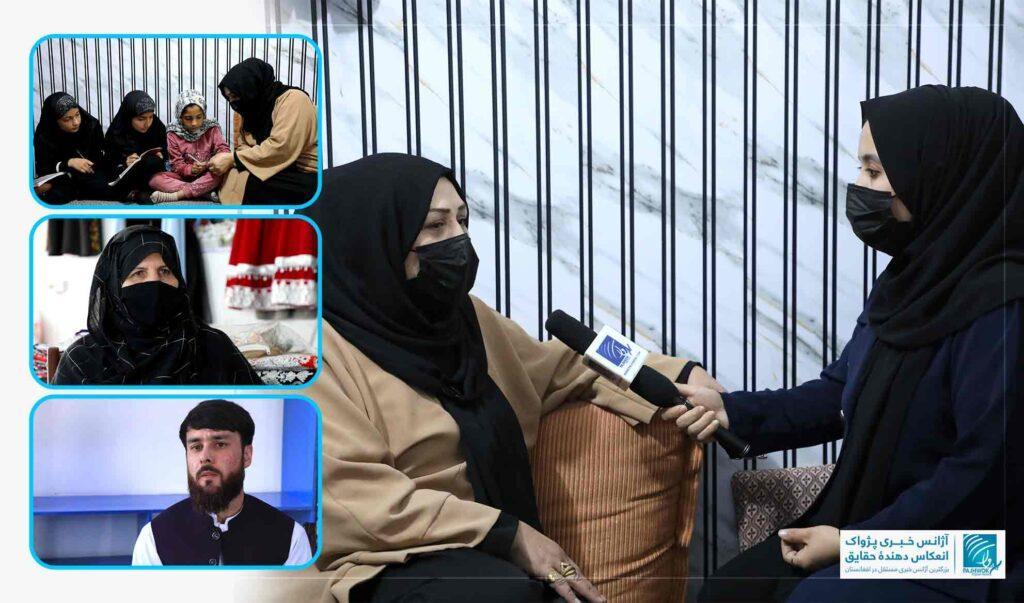
The Significance Of Women's Role, Their Influence On Society
KABUL (Pajhwok): A number of Afghan women, sharing their experiences and activities concerning family, education, economy, health and the environment, say that despite numerous challenges, they strive to contribute to the betterment of society. Meanwhile, scholars and religious authorities also recognize women's role in societal growth and dynamism as important and influential.
This report presents examples of Afghan women's efforts across various sectors, highlighting their contributions to societal progress and vitality.
Women: The pillars of family peace and in raising generations
Women are considered the main pillars of peace and the development of future generations within the family. By managing household affairs, educating children, and supporting family members, they not only strengthen the foundation of family life but also play a crucial role in transmitting values and culture to the next generations.
Qudsia Azizi, a resident of Kabul and a mother of three daughters and two sons, says:“I have always tried to ensure my children receive education and achieve high accomplishments; thank God, all of them have reached high degrees. Two of my daughters are doctors, one son bas graduated from Computer Science, and another son is in eleventh grade.”
Azizi also encouraged her children to study religious subjects alongside contemporary sciences. All her children are Quran reciters, and one of her daughters is currently memorizing the Holy Quran.
She, who works as a teacher in a Kabul school, added that she has never neglected her students' education either.
Najiba Kakar, Azizi's sister-in-law, speaks highly of her:“My brother's wife has been like a mother to me and my sister, a loving and supportive wife to our late brother, and an excellent mother, friend, and guide to her own children. Her good character has brought unity and harmony among my brothers.”
Women: Drivers of family economy and societal development
Women also play a vital role in both family and societal economies.
Maria Amiri, head of the handicraft company Bano Amiri, is a woman who not only contributes positively to her family's finances but has also provided employment opportunities for ten other women.
Amiri, 48, a mother of four, currently lives with her son after her husband passed away 11 months ago due to cancer. She is now the sole provider for her family.
She explains that about seven years ago, due to financial difficulties, she began sewing, purchasing two manual sewing machines to help support her family alongside her husband. Gradually, her business flourished, and she established a sewing workshop in the Khairkhana area of Kabul, providing employment for ten women engaged in clothing, embroidery, ironing, and cutting.
Over the past seven years, she has trained around 100 women and girls in sewing, paying her active employees between 2,000 to 5,000 afghanis per month.
She said,“Despite economic challenges and reduced sales, I pay my master worker 5,000 afghanis monthly and 2,000–4,000 afghanis to other employees. I am happy to serve society and support women.”
The women employed in her workshop expressed their satisfaction.
Sadaf Karimi, a sewing workshop employee, says she started working three years ago with no experience and has now learned all sewing processes. She earns around 3,000 afghanis per month, helping to cover family expenses and house rent. Karimi added:“Besides the monthly salary, we can also work daily and receive a percentage from the sales of expensive embroidery pieces.”
Women's impact in healthcare
Habiba, a 70-year-old resident of Zaranj, Nimroz province, has worked as a midwife for more than 45 years, saving countless mothers' lives. She often travels to remote areas of Zaranj to assist women during childbirth.
“I have helped mothers both at home and in the hospital. Even though I am now elderly and retired five years ago, I still assist mothers at home, and people continue to trust me completely,” she said.
Shamsia, one of Habiba's patients, recalls that during her eighth month of pregnancy, she faced serious complications, and no doctor could diagnose her condition except for Habiba. With her experience and skill, Habiba identified an issue with the umbilical cord and the baby's position without any ultrasound equipment.
Shamsia said:“During the eighth month, there was bleeding from the womb and itching all day. When I went to Habiba, she examined me manually, diagnosed the umbilical cord tear due to the baby's size, and identified the baby's head position... everything without any ultrasound.” She emphasized that Habiba's presence is extremely valuable for the provincial hospital, and her family continues to seek her assistance during childbirth.
Health educator: Serving people is my life's mission
Marina Barakzai, a health educator in Jawzjan province, said she has spent five years raising awareness in districts and villages about nutrition, breastfeeding, and education, believing that every small effort to improve people's lives is valuable.
“For five years, I have been raising awareness about nutrition, breastfeeding, hygiene, and education in districts and villages. I have always believed that serving people is the true mission of a human. Whenever I saw a mother learn about healthy nutrition, I felt all my efforts were worthwhile. My goal has always been to contribute a small share to improving people's lives,” she said.
Women's education: Enlightening generations
Across the country, many women work as teachers in public and private educational institutions, playing a prominent role in improving the quality of education.
Nazaneen Kohistani, a teacher for 33 years, says her passion for education led her to teach literacy to women starting from the ninth grade. She, a graduate in education, currently teaches in a private school and has established a home course where she teaches girls both contemporary and religious sciences.
She explained:“Women's emotions are different and more delicate than men's. Just as a mother feels love and care for her child, she can have the same feeling for her students.”
Women's role in environmental protection
Women play a key role in environmental protection, participating in social activities such as awareness campaigns and cleaning initiatives, as well as maintaining cleanliness at home and in the community.
Zarghona, a resident of Zaranj, Nimroz province, has been active in environmental preservation and promoting cleanliness for many years. At 50 years old, she has engaged in gardening and home decoration since her marriage.
“When I got married, my husband traveled frequently. We had one jerib of land where I planted various flowers and plants, irrigated and maintained them, and created small gardens around the house,” she said.
Currently, Zarghona teaches at a school in Zaranj and encourages her students to keep clean and manage waste properly.“Cleanliness is part of faith. If we keep our homes clean, we must also keep our city clean,” she emphasized.
She has built a large garden in her backyard, personally managing its irrigation and pruning. For the past ten years, she has been a member of Zaranj Municipality's Cleaning Committee, volunteering in cleanliness campaigns and educating youth.“During public cleaning days, I inform and encourage young people via social media to participate in keeping the city clean,” she added.
Experts: Women play a significant role in social and economic progress
Qazi Mohammad Hasan Haqyar, a religious scholar, stated:“Islam recognizes women as half of society and values them in all aspects of life. There is no field where women are not considered alongside men.”
He added that women have important roles in family, child-rearing, education, health, and other sectors.
“In the history of the Sahaba (companions of the Prophet), we saw that Bibi Aisha was the best scholar of her time; men and women would refer to her for religious guidance. During the era of the Rightly Guided Caliphs, Umar ibn al-Khattab appointed a woman named Umm Shafa as a security commander. Women treated the wounded during battles, which shows that women were active in all aspects of life,” he said.
He noted that women have a more significant role than men in education and child-rearing.
During the Battle of Jamal, Bibi Aisha led an army, demonstrating political leadership. The Quran also mentions Queen Bilqis of Yemen, illustrating that religion values women in all aspects of life.
Mufti Shamsul Rahman Frotan, another religious scholar, stated that women play an equally important role as men in social, health, and economic sectors. He highlighted women's contributions in healthcare since the time of the Prophet Muhammad (PBUH), citing Umm Sulaym treating the wounded in battles, showing that women can work in hospitals and on battlefields to assist the injured.
“In Afghan society, when women doctors are available, families can take female patients to them with peace of mind. Many women have died because they did not go to male doctors, making female doctors essential,” he said.
Frotan also emphasized women's role in politics:“Women participate in society just like men. God mentions that when faithful women pledged allegiance to the Prophet, it had political and social dimensions, showing women's involvement in societal affairs.”
Regarding women's economic role, he said:“God says in Surah An-Nisa that both men and women have a share of wealth they earn themselves, indicating that women can be businesswomen, work, earn income, and actively contribute to society's economy.”
Finally, he stressed the importance of women's education:“The Prophet said seeking knowledge is obligatory for both men and women; thus, women should also be active in education.”
Social expert Mashal Stanikzai told Pajhwok that women's role is vital in all parts of society. He emphasized the importance of women in medicine, noting that in some cases, men cannot address women's health issues, making female doctors indispensable.
He also highlighted teachers' role in education and societal development:“Women teachers are the foundation of literacy in society, and without them, society would remain illiterate.”
Stanikzai emphasized that educated women can play an effective role in societal progress and development.
Similarly, Tafsir Siahpush, a women's rights expert, said Islam has always given women and men the opportunity to serve and be active in all social fields. Islam views men and women as partners in many human and social responsibilities and encourages both to seek knowledge and serve society.
He stated that the status Islam gives women is not given in other religions.
sa/ma

Legal Disclaimer:
MENAFN provides the
information “as is” without warranty of any kind. We do not accept
any responsibility or liability for the accuracy, content, images,
videos, licenses, completeness, legality, or reliability of the information
contained in this article. If you have any complaints or copyright
issues related to this article, kindly contact the provider above.


















Comments
No comment